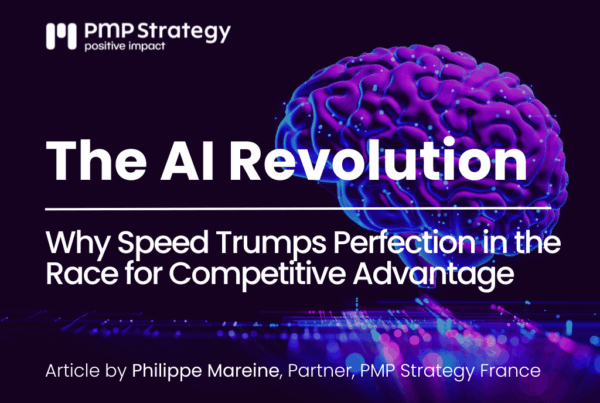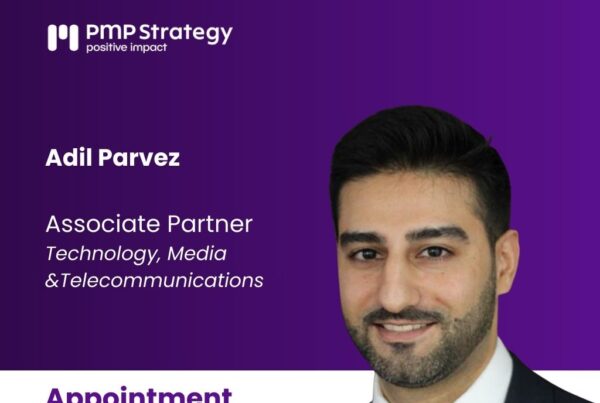Article published on LinkedIn on October 27th, 2024
Author: Olivier Leroy, Head of the Data Lab in the Paris Office of PMP Strategy
Even though the integration of AI can seem like a mountain to climb for a structure with limited resources, AI positions small and medium-sized enterprises (SMEs) at a strategic crossroads. The task automation it enables offers unprecedented opportunities for SMEs to compete with large corporations.
This week’s AI news clearly confirmed a new growing trend: the advent of AI agents. Salesforce CEO Marc Benioff announced a new global strategy focused on agent-based systems and microservices. This approach will replace the traditional SaaS model (CRM, Analytics, technology stacks) with a massive deployment of autonomous agents. The goal of Salesforce AgentForce is to deploy 1 billion AI agents by the end of 2025, who will manage tasks without supervision, such as customer segmentation and the launch of associated marketing campaigns, paving the way for large-scale automation. In the same week, Anthropic unveiled their “Computer use” feature, which allows Claude 3.5 (their AI competitor to ChatGPT4o), to take control of a computer to execute tasks.
Companies that place AI and digital at the core of their strategy manage to have global impact with very small teams: Telegram manages its messaging service, used by hundreds of millions of people worldwide, with only 50 employees. OpenAI, with a similarly sized customer base and 3,500 employees, reaches a valuation of $157 billion. These examples show that it is possible to manage large-scale operations with a small team, thanks to AI and automation.
At the local level, all SMEs can draw inspiration from these models: Automating customer acquisition (lead generation, production and distribution of digital content, customer base animation) can have a significant ROI for a budget of $500/month. Another example: creating a strategic monitoring service which tracks new market trends and competition moves is now possible with $5,000 investment in services and a usage cost of less than $100/month, without the need for new (human) resources.
By adopting these services, SMEs can adopt the same technologies as large corporations, bridging the resource gap in two ways:
· Producing as much content with less expertise (using AI as an assistant)
· Producing with fewer hands (using AI as an agent)
The most common challenges SMEs face are the rapid pace of technological advancements, which can seem overwhelming, and recruiting qualified talent due to salary constraints. To overcome these obstacles, management must feel that they can control the speed driven by exponential technologies. This is possible by sticking to four fundamental points:
· Adopt a “North Star” vision, which is the “blue-sky” version of a product (set of features) or a job (set of tasks), while keeping the long-term business goal in mind. Technological integration is a transitional step, not an end in itself. Taking small incremental steps is a good way to go in terms of integration and automation, to avoid over-investing and improve technological know-how.
· Recruit a CTO capable of integrating technology into the business objectives, i.e. a seasoned technology partner and knowledge architect. His salary will be offset by the lower cost of less experienced employees supported by AI assistants and the implementation of autonomous agents.
· Develop and integrate continuously: regularly integrate the latest contributions of new technologies. Today, for example, OCR has become a very cheap commodity; yet few small businesses use this capability to read PDF documents to retrieve or verify contractual conditions.
· Monitor technological trends and identify a method to keep abreast on innovations brought about by exponential technologies; understand that these technologies converge and are designed to interact without heavy consequences on technical architecture choices.
By mastering the Cloud, AI, APIs, task automation (and soon, robots), an SME can become remarkably efficient despite limited resources. In contrast, large companies will face the challenge of updating their human resources and maintaining profitability even if they are not able to implement the automated tasks.
The adoption of AI and automation is an unparalleled opportunity for SMEs. It enables them to remain competitive by readjusting business models and revising job tasks at the pace recommended by their Chief Technology Officers. tech. It also facilitates cost reductions and increased productivity.

Olivier Leroy is the creator and manager of PMP Strategy’s datalab, Lab32. He has driven many analytical projects, mainly on multidimensional data, data visualization and process mining as both Project Manager with the business teams and as the Analytical Solution Designer. His expertise extends to the design and implementations of systems including relational databases, data visualization, machine learning, real-time analysis, unstructured data and cloud architecture.
Olivier is Professor of dataviz at ESCP Europe, and co-authored “l’Aventure Noétique”, a book describing the probable future of man in a digital world.
About PMP Strategy
PMP Strategy’s sectorial expertise extends to four focus areas: Telecoms, Media & Technology, Transportation & Mobility, Energy & Industry Decarbonization (with a focus on new energies, hydrogen, and decarbonization), and Financial Services & Institutions. In addition to these sectors, we offer three transversal cross-border services: CFO advisory (including ESG management), Digital/E-commerce/Customer Experience consulting and Private Equity.
PMP Strategy is managed by 21 partners, which include 5 of the Founders. Over the past twenty years, we have established ourselves as trusted premium partners to CEOs and CFOs with over 4,000 successful projects driven by our international team of 150 specialized consultants and a wide network of expert advisors. PMP Strategy operates from three key hubs: Europe, North America, and the Middle East.
We build enduring relationships with our clients by working collaboratively to find tailor-made and innovative solutions to the challenges they face. In addition to our sectorial expertise, our commitment to diversity, people-centricity, and openness are the foundations of our success and remain integral to our entrepreneurial practice. It’s a winning combination that drives consistent growth each year.
Press contact:
Jennifer Campbell
+33 6 32 05 14 27




